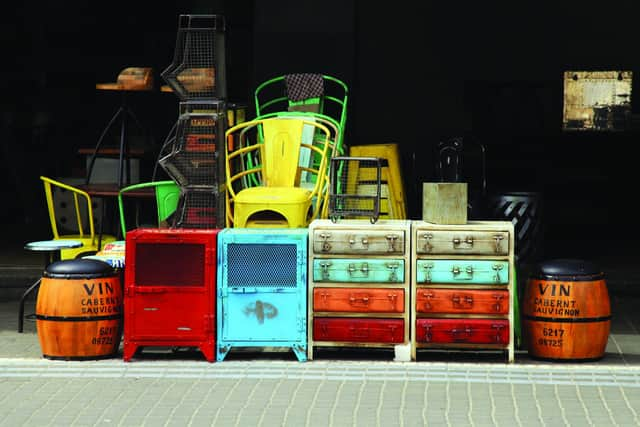Kirsty McLuckie: Getting down with the upcycling trend
But actually, conscious of our carbon footprints, perhaps we should all question whether replacing a sofa with a brand-new model every couple of years is enviable – whether we have family heirlooms to inherit or not.
The ONS calculates that Scots spend more than 3 per cent of an average weekly income on furniture, which equates to around £816.40 each year.
Advertisement
Hide AdAdvertisement
Hide AdBut recycling can be a fantastic solution for homemakers looking for alternatives to spending big onbrand-new furniture and – as well as being far less expensive – this way of sourcing household items is a lot more environmentally astute.


And, it seems, I was born virtuous in this regard.
Most of my furniture comes from the homes of friends – what they see as dilapidated and past it, I see as an opportunity, and I just can’t resist accepting all donations.
Charity shops are another fantastic source of pre-loved furniture. Visiting one in Glasgow recently I was amazed at the range of nearly-new, good-quality stuff at knock-down prices. I have decided to go back with a van.
Why anyone would be tempted to buy from a high-street showroom is beyond me, no matter how strident the claims about never-ending sales.
Local freecycle sites are also great places to source household basics, and while you might not want to accept a used mattress, it is definitely true that older tables, chairs and bed frames will likely have been built to last, not designed to end up in landfill before the end of a decade.
But would I go further in my search for a “unique” item, and attempt to make my own?
Advice from website Skips & Bins suggests that it isn’t just older pieces of furniture that should be saved from landfill, but with a bit of lateral thinking, items you might never think of using to furnish your house can be put to good use.
Take wooden pallets, for instance. Wood is a versatile material, with scope for reinvention. Small side tables are easy to make from such cast-ways, the advice states. Not only are they pretty sturdy, but you can paint them to match your décor .
Advertisement
Hide AdAdvertisement
Hide AdThe website suggests that more courageous DIYers can combine a few pallets to create larger furniture pieces, such as desks, bookshelves, and even sofa and bed frames, with a few added extras.
Similarly, old textiles can be made into characterful cushions, and even metal can be utilised to reinforce larger objects or just add a rustic vibe.
Alas, this might be beyond my skill set, I admit that the furthest I’ve ever got with furniture making was a bit of light stippling while stencilling a footstool, back in the day when that was all the rage.
But I have the greatest admiration for those with the skill to upcycle unconsidered trifles into something really useful and unique.
And in an age of reuse, recycle and repurpose, maybe people who buy their own furniture deserve a bit of sneering, to encourage them to improve their wasteful ways.
Let’s try to reverse the boasting – “You bought your sofa in a shop? How last year! We fashioned ours out of a milk crate, some coat hangers and the husband’s old work trousers.”
- Kirsty McLuckie is property editor at The Scotsman